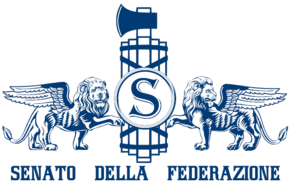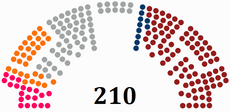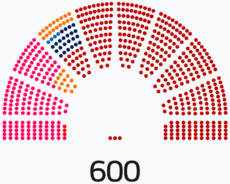Senate of Etruria
Senate of the Federation Senato della Federazione | |
|---|---|
 | |
| Type | |
| Type | |
| Houses | |
| History | |
| Founded | 12 August 1811 |
| Preceded by | Senate of the Republic |
| Leadership | |
| Structure | |
| Seats |
|
 | |
State Council of the Federation political groups | Government (90): Tribune Movement/Social Party of the Third Order (MT/PSTO) 90 Supported by (10) Farmers and Workers Union (10) Opposition (40) Citizesn' Alliance (30) Social Democratic Party (20) Non-Partisan Independents (60) (60) |
 | |
Chamber of Representatives political groups | Government (373): Tribune Movement/Social Party of the Third Order (MT/PSTO) 373 Supported by (23) Farmers and Workers Union (23) Opposition (204) Social Democratic Party (166) Citizesn' Alliance (31) Sotirian People's Force (4) Popular Renewal (4) |
Length of term | 6 years (State Council) 5 years (Chamber) |
| Elections | |
Chamber of Representatives last election | 08 October 2021 |
Chamber of Representatives next election | 2026 |
| Meeting place | |
 | |
| Palazzo Orsini, Povelia, Etruria | |
The Senate of the Federation (Vespasian: Senato della Federazione) is the national and federal legislature of Etruria. The Senate is bicameral, with the upper house formed by the State Council of the Federation (with 210 members) and the lower house formed by the Chamber of Representatives (with 600 members). The Senate was established in 1811 under the semi-constitutional monarchy during the United Kingdom of Etruria, though was preceded by the Senate of the Republic, the unicameral legislature of the Etrurian First Republic. The Etrurian senate alone possesses legislative supremacy and as a result, ultimate power over all other political bodies in Etruria. The two chambers sit in separate chambers at the Palazzo Orsini in Povelia.
The State Council of the Federation has 210 members, though they are assume their seats in two distinct ways. Of the 210 members, 60 are non-partisan independents, appointed by the President of Etruria with approval of the Federal Cabinet on the basis of "contributions to national life" and "essential expertise." They hold their seats for six-year terms and can be renewed via re-appointment. The 150 members remaining are appointed by the States of Etruria, either through appointment by Prefects or via confirmation votes by the state assemblies, resulting in the governing party of that state appointing partisan members, they serve for either five or four years depending upon the terms of their respective state government.
The Chamber of Representatives is the primary chamber and is wholly elected with 600 members. The Chamber has two separate types of members, 500 are elected to single-member constituencies and 100 are elected to a singular national constituency; the "500" are elected via first-past-the-post and the "100" are elected via a party list and proportional representation. All 600 members are subject to a maximum five-year terms, though renewable without limit. Under the Etrurian Constitution (1983), all Federal Ministers, including the President and Deputy President are required to be members of the Chamber and not the State Council, though Undersecretaries and Deputy Federal Ministers may be drawn from the State Council.